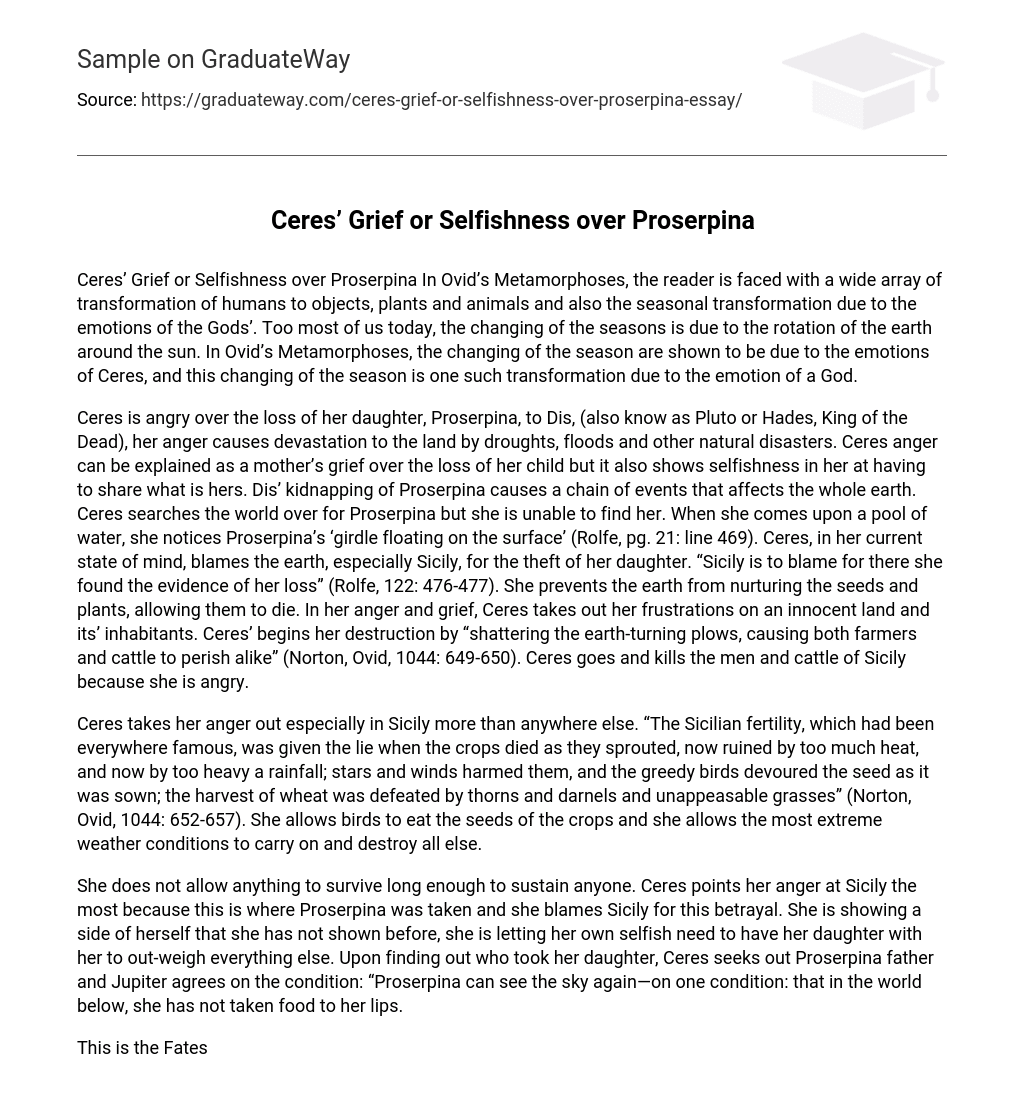In Ovid’s Metamorphoses, various transformations are depicted, including humans turning into objects, plants, and animals. Additionally, the changing of seasons is attributed to the emotions of the Gods. While most people nowadays believe that the changing seasons result from the earth’s rotation around the sun, in Ovid’s Metamorphoses, these changes are shown to be a consequence of Ceres’ emotions. Thus, the seasonal transformation is also considered a result of divine emotions.
The abduction of Proserpina by Dis angers Ceres greatly, resulting in widespread devastation such as droughts, floods, and other natural disasters. While Ceres’ anger can be understood as a mother mourning the loss of her child, it also reveals her selfish desire to possess what is exclusively hers. Dis’ kidnapping of Proserpina triggers a series of events that impact the entire planet. Despite searching extensively for Proserpina, she remains missing. However, during her search, Ceres comes across a pool of water with Proserpina’s girdle floating on its surface. Blaming the earth and specifically Sicily for her daughter’s theft, Ceres prevents it from nurturing seeds and plants which leads to their demise. In her anguish and rage, Ceres directs her frustration towards an innocent land and its inhabitants. She begins her destruction by breaking the earth-turning plows, causing harm to farmers and livestock alike. Driven by anger, Ceres goes on to kill both men and cattle in Sicily.
Ceres expresses her anger particularly in Sicily, above all other places. The fertility of the land in Sicily, which had once been renowned, was proven false as the crops perished even as they started to grow. This destruction was caused by excessive heat and heavy rainfall, as well as by harmful stars and winds. Furthermore, birds greedily consumed the seeds as they were planted, while thorns, darnels, and stubborn grasses spoiled the wheat harvest. Ceres permits these events to occur, allowing birds to devour the crop seeds and extreme weather to persist and ruin everything in its path.
Ceres directs her anger towards Sicily as she holds them responsible for Proserpina’s abduction. Her selfish desire to be with her daughter overrides any other concern. After discovering the culprit, Ceres seeks out Proserpina’s father, Jupiter, who agrees to a condition: “Proserpina can see the sky again—on one condition: that in the world below, she has not taken food to her lips.”
Ceres is convinced that her daughter has not eaten and will be able to return home with her. However, the Fates do not share her confidence as Proserpina has already satisfied her hunger by unknowingly eating seven pomegranate seeds while wandering through death’s formal gardens. Despite Ceres’ hope, she is unable to keep her daughter with her at all times.
Proserpina’s anger and grief continue to be directed towards the world. Jupiter grants her a compromise where she can spend half of the year with her mother and the other half with her husband, Hades, in the underworld. When Proserpina is with her mother, Ceres, the earth flourishes with the seasons of spring, summer, and early fall. The land is fertile, crops are planted and harvested, farmers and animals thrive, and nature is in perfect balance. This period is marked by the abundance of Ceres’ gifts, bringing happiness and prosperity to everyone.
During this time of year, Ceres is filled with joy as she has her daughter by her side. The presence of her daughter brings happiness to everyone, enabling them to thrive and live contentedly. However, during the period when Proserpina is in the Underworld with her husband Hades, the earth endures the harsh grip of winter. In these months, no crops are cultivated or harvested, and both farmers and animals struggle to survive in the bitter conditions. Winter serves as a reminder that Ceres, although mourning for her daughter, directs her resentment towards the land due to her separation from her beloved child.
The text argues that Ceres exhibits selfishness through her anger and wrath, refusing to share what she believes is hers and instead projecting her fury onto the world. This is demonstrated when she punishes the world for her own loss, although the cycle of seasons is a natural occurrence. Ceres’ selfishness also becomes evident in her desire to keep Proserpina, her daughter, exclusively for herself, refusing to allow her to be with Hades. Moreover, Ceres’ love for her lost child transforms into a destructive force, causing the world to suffer and stagnate. However, when Proserpina is reunited with Ceres, her happiness fuels the earth’s fertility. Ultimately, the text suggests that Ceres’ changing emotions – happiness, grief, and selfishness – play a vital role in shaping the world.





